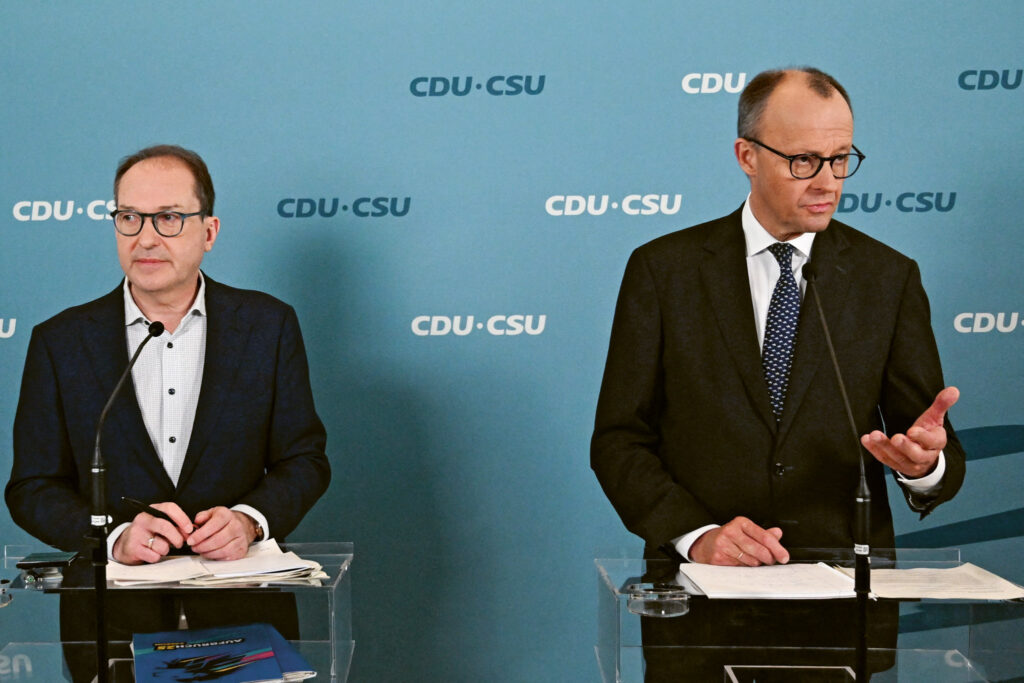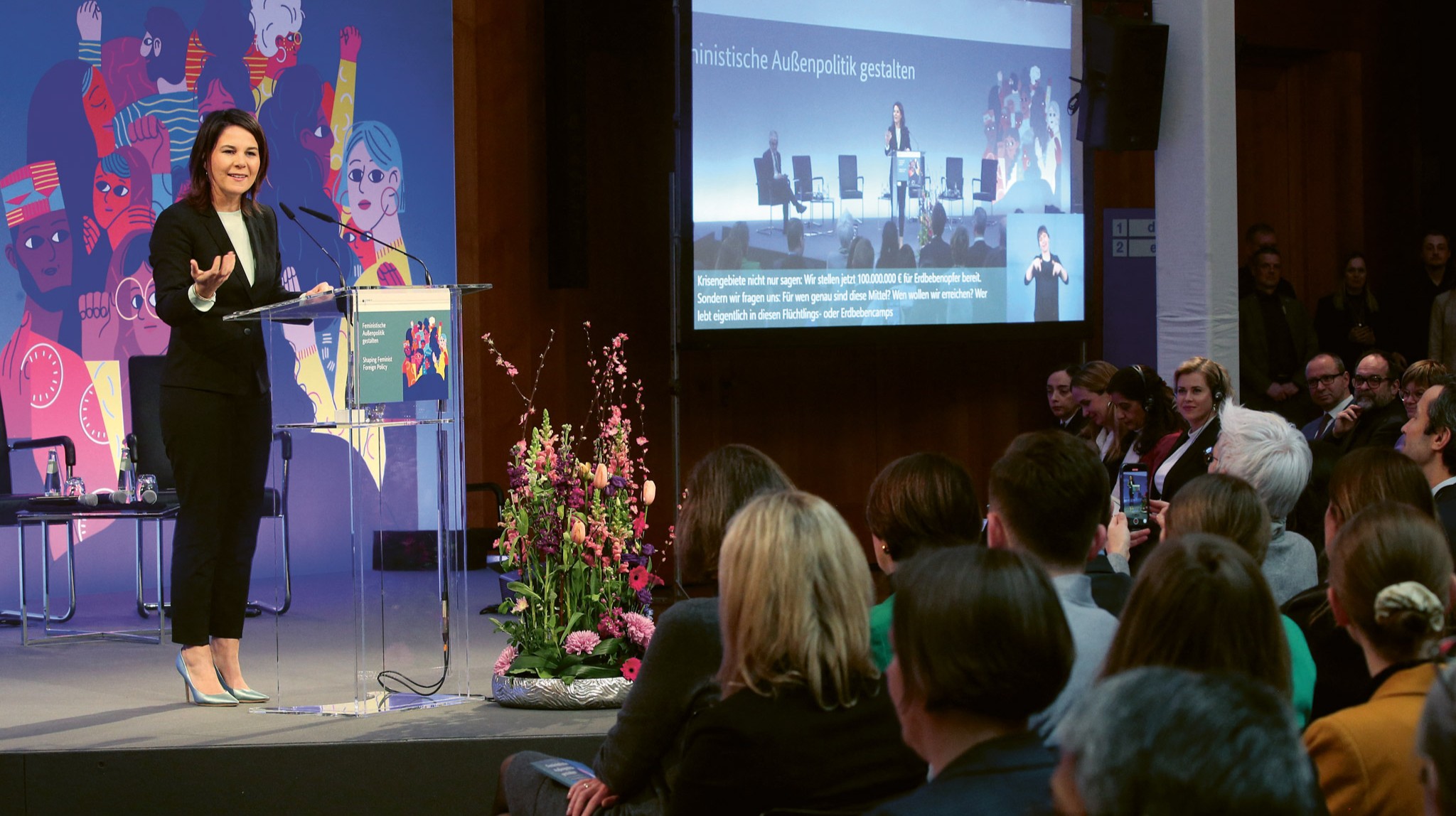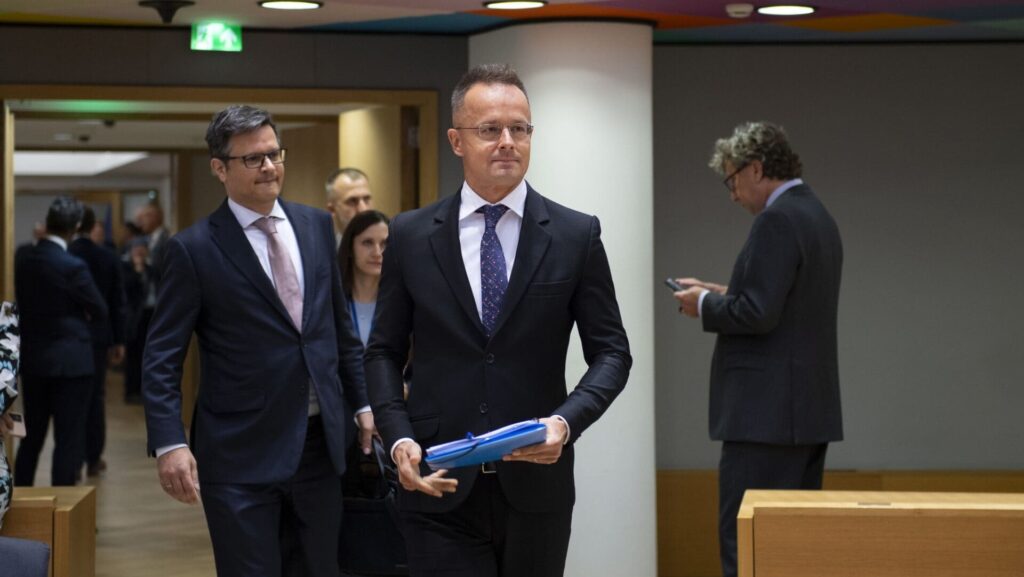This article was originally published in Vol. 5 No. 3 of our print edition.
The Exhaustion of Moral Posturing: How Berlin Lost the Plot
23 September 2025 will be remembered as the day the era of values-based foreign policy finally expired. In the ornate chambers of the United Nations General Assembly, two contrasting visions of international relations played out in stark relief: President Donald Trump commanding the world stage for nearly an hour with uncompromising assertions of American sovereignty and national interest, while Germany’s former Foreign Minister Annalena Baerbock presided over the session in what can only be described as a ceremonial role befitting the twilight of European moral pretension.
The symbolism was perfect, almost literary in its precision. Baerbock, the architect of Germany’s wertebasierte Außenpolitik or ‘values-based foreign policy’, reduced to wielding the Assembly’s ornate Icelandic gavel whilst Trump delivered a masterclass in sovereign realism. Here was the living embodiment of Europe’s post-war delusion: that moral posturing could substitute for strategic capability, that universal values could override national interests, and that multilateral institutions could provide security without the willingness to defend it.
Trump’s 56-minute address was a comprehensive dismantling of every comfortable assumption that has guided Western foreign policy since 1945. His criticism was not merely a rhetorical flourish but a systematic deconstruction of the liberal internationalist framework that Baerbock and her generation of European leaders have championed. ‘What is the purpose of the United Nations?’, Trump asked the assembled delegates. ‘The UN has such tremendous potential…but it’s not even coming close to living up to that potential.’1
The Theatre of Moral Bankruptcy
The contrast between Trump’s dominance and Baerbock’s ceremonial function captured the broader crisis of European strategic culture. Here was Germany’s former foreign minister—who had spent three and a half years lecturing authoritarian regimes about human rights and democracy—reduced to the procedural role of session chair whilst real power spoke with unvarnished clarity about national interests and strategic priorities.2
‘The tragedy of contemporary German foreign policy lies…in the presence of domestic constraints that prevent effective action’
Baerbock’s presidency of the 80th General Assembly session, themed ‘Better Together: 80 Years and More for Peace, Development and Human Rights’, represented everything that has gone wrong with post-war European diplomacy. The theme itself—a platitudinous appeal to multilateral cooperation divorced from any recognition of power realities—embodied the intellectual poverty of values-based foreign policy. It was telling that her opening address, delivered the day before Trump’s speech, focused on reforming the United Nations to make it ‘fit for the 21st century’, as if institutional tinkering could address the fundamental reality that international organizations cannot generate capabilities their members do not possess.3
The irony was inescapable. Baerbock, who had made her reputation by describing Chinese President Xi Jinping as a ‘dictator’ and telling Chinese Foreign Minister Qin Gang that Germany would not be lectured by authoritarian regimes, now found herself presiding over an organization whose largest financial contributor was systematically withdrawing support for the multilateral framework she championed. Trump’s announcement that he would use tariffs to force European compliance with American strategic priorities demonstrated the hollowness of European claims to strategic autonomy.
The feminist foreign policy that Baerbock had championed throughout her tenure as foreign minister stood exposed as perhaps the most delusional aspect of German diplomatic practice. Her conviction that ‘feminist foreign policy is not synonymous with pacifism [but] considers both the values and the interests of German foreign policy’4 represented the kind of conceptual confusion that sovereign realism ruthlessly exposes. The attempt to reconcile gender ideology with geopolitical necessity had produced not strategic coherence but intellectual incoherence—a foreign policy that satisfied neither feminist ideological demands nor German national interests.5
The naivety of Baerbock’s approach became most apparent in her handling of authoritarian regimes. Her belief that lecturing China about human rights whilst maintaining massive trade dependencies would somehow moderate Chinese behaviour represented a fundamental misunderstanding of how power operates in international relations. When she declared that ‘we must not be naive’ whilst pursuing policies that were the epitome of naivety, she embodied the self-deception that has characterized European foreign policy for decades.6
Trump’s Sovereign Manifesto
Trump’s address represented more than mere criticism of international institutions; it constituted a comprehensive manifesto for the post-liberal international order. His claim to have ended seven wars whilst the United Nations ‘did not even try to help in finalizing the deal’7 was a direct challenge to the assumption that multilateral institutions are inherently more legitimate than unilateral action by capable powers. The substance of Trump’s critique extended far beyond institutional failure to address fundamental questions about the nature of international relations in the multipolar age. His warning to European leaders that ‘your countries are going to hell’ due to uncontrolled migration was not mere rhetorical excess but a recognition that demographic transformation represents an existential challenge to the nation-state system that underpins international order.
Similarly, Trump’s dismissal of climate change as ‘the greatest con job ever perpetrated on the world’ was not anti-scientific obscurantism but a rejection of the globalist assumption that abstract universal concerns should override concrete national interests. His argument that European electricity bills ‘are now four to five times more expensive than those in China’ due to green energy policies highlighted the self-imposed economic handicaps that have undermined Western competitiveness.8
Most significantly, Trump’s threat to impose ‘powerful tariffs’ on Russia unless European nations cease energy purchases from Moscow demonstrated how economic nationalism could achieve strategic objectives that years of multilateral diplomacy had failed to accomplish. The implicit threat—that the United States would treat European enablement of Russian aggression as economic warfare against American interests—represented a fundamental shift from alliance cooperation to transactional relationships based on mutual interest rather than shared values.
The duration of Trump’s speech—nearly an hour of uninterrupted discourse—stood in stark contrast to the brief, procedural remarks that characterized most other interventions. Here was a leader who understood that commanding attention is the first requirement of political influence, that presence matters more than procedure, and that the ability to define the terms of debate is more valuable than a formal institutional position.
The Collapse of German Strategic Credibility
Baerbock’s ceremonial role at the Assembly highlighted the broader collapse of German strategic credibility. Her tenure as foreign minister had been marked by a series of diplomatic failures that illustrated the fundamental contradictions inherent in values-based foreign policy. Her confrontational approach toward China had succeeded only in alienating the world’s second-largest economy without advancing German interests or improving conditions for Chinese dissidents.
The failure was not merely tactical but conceptual. Baerbock’s belief that Germany could simultaneously maintain massive economic dependencies on authoritarian regimes whilst lecturing them about human rights represented the kind of strategic incoherence that Trump’s approach ruthlessly exposed. When Qin Gang dismissed Germany as an unwelcome ‘teacher from the West’, he was responding not to German moral authority but to the presumption that countries dependent on Chinese markets could credibly threaten Chinese interests.9

The feminist foreign policy framework that Baerbock had championed only compounded these contradictions. The notion that international relations could be fundamentally transformed by applying gender perspectives to traditional diplomatic practice represented a category error of extraordinary proportions. The attempt to pursue what she termed ‘an evidence-based feminist foreign and security policy [that] rejects the realpolitik narrative of security through weapons’ whilst simultaneously supporting arms deliveries to Ukraine and Israel demonstrated the intellectual bankruptcy of ideologically driven diplomacy.10
The contradiction became even more apparent in Germany’s approach to the Gaza conflict. Baerbock’s unwavering support for Israeli military operations, including the authorization of over €300 million in arms exports during the height of the conflict, whilst simultaneously claiming to champion humanitarian values through feminist foreign policy, exposed the selective application of moral principles that characterizes values-based foreign policy. This approach alienated Global South partners without advancing either German interests or the humanitarian objectives it claimed to serve.11
The pathological dimension of Baerbock’s worldview became apparent in her repeated insistence that feminist foreign policy could reconcile irreconcilable contradictions. Her claim that ‘feminism doesn’t mean telling victims of violence: Don’t defend yourself!’ whilst simultaneously promoting policies based on the assumption that traditional security thinking was inherently patriarchal demonstrated the kind of ideological confusion that sovereign realism renders obsolete.12
The End of Transatlantic Free-Riding
Trump’s General Assembly address marked the definitive end of transatlantic relations as Europeans have understood them since 1990. His criticism of NATO members for purchasing Russian energy whilst fighting Russian forces demonstrated that the United States under Trump would no longer tolerate the kind of strategic free riding that has characterized European foreign policy for decades.
The broader implications extend far beyond burden-sharing to fundamental questions about the nature of alliance relationships in the multipolar age. Trump’s approach—characterized by transactional relationships based on reciprocal benefit rather than shared values—represents a return to classical balance-of-power politics that European leaders have been systematically unprepared for.
The European response to Trump’s ultimatum on Russian energy purchases will determine whether the continent can adapt to this new reality or will remain trapped in the institutional frameworks of a bygone era. Germany’s continued dependence on Russian gas imports through third countries, whilst providing military aid to Ukraine, epitomizes the kind of strategic incoherence that Trump’s approach will no longer accommodate.
The feminist foreign policy paradigm that had guided German diplomacy under Baerbock proved particularly unsuited to this new environment. The emphasis on multilateral cooperation, gender mainstreaming, and the rejection of ‘patriarchal’ security thinking left Germany intellectually and strategically disarmed when confronted with the hard realities of great power competition. Trump’s unapologetic assertion of American interests and his willingness to use economic coercion to achieve strategic objectives represented everything that feminist foreign policy had been designed to transcend.
Merz: The Promise and Peril of Half-Measures
The elevation of Friedrich Merz to the German chancellorship in May 2025 appeared to offer hope for a fundamental reorientation of German foreign policy.13 Unlike the ideologically driven Baerbock, Merz represented a return to traditional realist thinking that prioritizes national interests over abstract universal values. His warning to German businesses that investing in China ‘comes with great risk’ and his description of an emerging ‘axis of autocracies’ comprising China, Russia, Iran, and North Korea suggested a leader willing to acknowledge geopolitical realities that his predecessor had systematically ignored.14
Merz’s approach to foreign policy has indeed demonstrated a more sophisticated understanding of power realities than anything seen during the Scholz–Baerbock years. His emphasis on creating ‘the strongest European army’ and his willingness to discuss nuclear sharing arrangements with France and the United Kingdom represented a recognition that military capability remains the foundation of effective diplomacy.15 His announcement of a €500 billion defence fund and his commitment to spending 5 per cent of GDP on defence and infrastructure suggested a leader prepared to make the investments necessary for genuine strategic autonomy.16
The chancellor’s critique of Germany’s previous foreign policy passivity was particularly astute. His observation that Germany had ‘for too long, existed in a false sense of security, believing that the repercussions of global disruptions would not reach its shores’ demonstrated an understanding of how geographic insularity had bred strategic complacency.17 His insistence that foreign policy should serve as the foundation for all policy areas, particularly economic policy, represented a welcome rejection of the compartmentalized thinking that had characterized previous governments.
Merz’s China policy, in particular, marked a significant improvement over the confused approach of his predecessors. His call for closer coordination with France and other European partners in dealings with Beijing and his warning about the risks of continued economic dependence on authoritarian regimes represented the kind of strategic thinking that had been absent from German policymaking for years. His commitment to ‘de-risk’ from China whilst maintaining necessary economic relationships suggested a more sophisticated understanding of how to balance competing priorities.18
However, Merz’s realism—whilst representing a significant improvement over Baerbock’s ideological confusion—remains fatally compromised by his failure to achieve genuine sovereignty in domestic politics. The first component of sovereign realism, the realism, may be present, but the second component, sovereignty, remains conspicuously absent. A leader who cannot control his own domestic political environment cannot credibly project power internationally, regardless of how sophisticated his understanding of geopolitical realities may be.
The Sovereignty Deficit: Merz’s Domestic Prison
The fundamental weakness of the Merz chancellorship lies not in its foreign policy analysis but in its domestic political constraints. The chancellor’s dependence on a ‘functional coalition’ with the Social Democrats—a partnership lacking genuine political vision or popular mandate—has left him unable to implement the kind of transformative policies that sovereign realism demands. With a parliamentary majority of barely 52 per cent and no control over the Bundesrat, Merz governs more as a caretaker than as the architect of strategic transformation.19
‘Germany faces a stark choice between continued strategic drift and fundamental transformation’
The most damaging constraint comes from the relentless rise of the Alternative für Deutschland (AfD), which has consistently polled above 20 per cent since Merz took office and recently20 achieved its highest-ever support at 27 per cent.21 This represents not merely political competition but an existential threat to the entire framework within which Merz operates. Every policy decision must be calculated not on its strategic merits but on its potential impact on AfD support—a dynamic that transforms governance from strategic leadership into defensive reaction.
The polling data tells the story with brutal clarity. Despite being in office for less than six months, Merz’s approval ratings have already begun to decline, whilst AfD support continues to grow. This trend suggests that the structural problems facing German democracy—demographic change, economic stagnation, cultural fragmentation—cannot be addressed through conventional political means. The constraints of coalition politics, media management, and electoral calculation prevent the kind of decisive action that sovereign realism requires.22
The immigration issue exemplifies this constraint perfectly. Merz’s recognition that uncontrolled migration represents a fundamental threat to social cohesion and political stability is strategically sound, yet his ability to address this threat is severely limited by coalition constraints and the fear that effective action might benefit the AfD. The result is a series of half-measures and symbolic gestures that satisfy neither the strategic requirement for border control nor the political necessity of neutralizing AfD’s appeal.
The chancellor’s controversial decision to work with AfD votes on migration policy in January 2025 demonstrated both his recognition of the issue’s importance and his inability to address it through conventional coalition politics. The massive political backlash that followed—including accusations that he lacked ‘integrity and reliability’ and was unfit to lead the country—highlighted how domestic political constraints prevent him from pursuing policies that strategic realism demands.23
The feminist foreign policy legacy of the previous government continues to constrain Merz’s options in ways that are both subtle and profound. The institutional capture of the Foreign Ministry by gender ideology activists, the embedding of ‘intersectional’ thinking in German development policy, and the international commitments made under the rubric of feminist foreign policy create bureaucratic and diplomatic constraints that persist regardless of changes in political leadership.
Merz’s inability to fundamentally restructure German strategic culture reflects broader problems with democratic governance in conditions of political fragmentation. The need to maintain coalition unity, manage regional political pressures, and respond to media criticism creates a decision-making environment that prioritizes tactical considerations over strategic coherence. The result is what might be termed ‘sovereignty theatre’—the appearance of independent action without the substance of genuine autonomy.
The AfD Alternative: Realism without Strategy
The continued rise of the AfD reflects popular recognition of the failures of both values-based idealism and constrained realism, yet the party’s approach to foreign policy demonstrates that nationalism alone cannot substitute for genuine sovereign realism. Whilst the AfD correctly identifies many of the problems with current German foreign policy—excessive deference to international institutions, dangerous economic dependencies, demographic transformation through immigration—its proposed solutions often reflect emotional reaction rather than strategic calculation.
The party’s scepticism toward American influence and its relatively sympathetic approach toward Russia may resonate with voters frustrated by Germany’s subordinate position in transatlantic relations, yet these positions fail to account for the realities of German strategic vulnerabilities. Similarly, the AfD’s opposition to European integration ignores the necessity of continental cooperation in addressing challenges that exceed national capabilities.24
The AfD’s continued growth represents not endorsement of its specific policy positions but rejection of the mainstream alternatives. The party’s success reflects the absence of genuine sovereign realism rather than its presence. Voters support the AfD not because they necessarily agree with its foreign policy platform, but because it represents the only political force willing to challenge the fundamental assumptions of post-Cold War German foreign policy.
The mainstream parties’ inability to address the concerns that drive AfD support—border security, cultural preservation, and economic nationalism—ensures continued political fragmentation and governmental instability. Merz’s recognition of these problems cannot overcome his inability to address them effectively within the constraints of coalition politics and media management. The result is a political system that produces neither effective governance nor popular legitimacy. The AfD continues to grow by highlighting problems that mainstream parties cannot solve, whilst mainstream parties maintain formal power by excluding the AfD from governance. This dynamic ensures continued policy paralysis whilst social and economic problems compound.
The Path Not Taken: Sovereign Realism Defined25
The failure of both Baerbock’s values-based idealism and Merz’s constrained realism highlights what genuine sovereign realism would require. The first component, realism, demands intellectual honesty about power relationships, national interests, and the limitations of moral rhetoric in international relations. The second component, sovereignty, requires the domestic political capability to act on that understanding regardless of international opinion, coalition constraints, or media criticism.
Sovereign realism recognizes that nation-states remain the primary actors in international relations and that successful foreign policy must be grounded in clearly defined national interests rather than abstract universal values. It rejects the notion that economic integration automatically produces political moderation, challenges the primacy of multilateral institutions over national sovereignty, and emphasizes the importance of military and economic capability in shaping international outcomes.
More fundamentally, sovereign realism demands the intellectual courage to acknowledge that different political systems and cultural traditions may be fundamentally incompatible, that demographic change can represent an existential threat to established political orders, and that the Western liberal model may not be universally applicable or desirable. These recognitions require leaders willing to act on unpopular truths rather than comfortable illusions.
The domestic dimension of sovereign realism is equally important. It requires political leaders capable of building popular coalitions around national interests rather than elite preferences, willing to challenge established bureaucratic and academic orthodoxies, and prepared to accept international criticism in pursuit of genuinely independent policies. It demands what might be termed ‘strategic ruthlessness’—the willingness to prioritize long-term national interests over short-term diplomatic convenience or domestic political calculation.
Neither Baerbock’s naive idealism nor Merz’s constrained realism meets these requirements. Baerbock failed the realism test by subordinating national interests to ideological preferences. Merz fails the sovereignty test by subordinating strategic imperatives to domestic political constraints. The result in both cases is a foreign policy that serves neither German interests nor the broader cause of international stability.
The International Dimension: Europe’s Strategic Orphanhood
Germany’s domestic constraints have profound implications for European strategic autonomy more broadly. As the continent’s largest economy and most populous member state, Germany’s inability to pursue a coherent foreign policy undermines broader European efforts to develop genuine independence from both American hegemony and authoritarian influence.
The EU’s ‘Readiness 2030’ programme, with its ambitious plans for continental defence integration, depends fundamentally on German participation and leadership.26 Yet Germany’s domestic political fragmentation makes sustained commitment to these objectives increasingly unlikely. The result is a European strategic framework that combines rhetorical ambition with practical impotence.
France’s efforts to develop European strategic autonomy are similarly constrained by Germany’s political paralysis. President Macron’s vision of a ‘sovereign Europe’ capable of independent action requires German partnership, yet such partnership is precisely what Germany’s domestic constraints make impossible to provide consistently. The result is episodic cooperation rather than systematic strategy.
The broader implications extend beyond Europe to the global balance of power. Germany’s failure to develop genuine sovereignty—whether under Baerbock’s idealistic leadership or Merz’s constrained realism—contributes to a power vacuum that authoritarian regimes are eager to fill. China’s growing influence in Central and Eastern Europe, Russia’s continued energy leverage over European economies, and America’s declining commitment to European security all reflect Europe’s inability to develop genuine strategic autonomy.
The feminist foreign policy legacy compounds these problems by creating intellectual and institutional obstacles to the kind of clear-eyed strategic thinking that continental defence requires. The emphasis on ‘gender mainstreaming’ in security policy, the rejection of ‘patriarchal’ military thinking, and the commitment to ‘intersectional’ approaches to international relations create bureaucratic constraints that persist regardless of changes in political leadership.
Conclusion: The Tragedy of Insufficient Transformation
The tragedy of contemporary German foreign policy lies not in the absence of strategic understanding but in the presence of domestic constraints that prevent effective action. Merz understands what needs to be done but lacks the political capability to do it. The result is a form of ‘strategic paralysis’ in which correct analysis produces ineffective policy, intellectual clarity coexists with practical impotence, and recognition of problems accompanies inability to solve them.
German voters increasingly understand that their country’s current approach to foreign policy serves neither national interests nor broader European objectives, yet the mainstream political system proves incapable of fundamental reform. The result is a downward spiral in which policy failures drive electoral fragmentation, which in turn makes effective governance even more difficult to achieve.
The international implications of Germany’s strategic paralysis extend far beyond bilateral German–American relations to the fundamental question of European sovereignty in the multipolar age. A continent that cannot produce effective leadership from its largest and most capable member state will inevitably find itself marginalized by more coherent competitors.
The feminist foreign policy residue that continues to constrain German strategic thinking—through bureaucratic inertia, international commitments, and intellectual capture of elite institutions—compounds these problems by creating ongoing obstacles to clear-eyed strategic analysis. The result is a foreign policy establishment that combines rhetorical sophistication with strategic incoherence, moral pretension with practical impotence, and international ambition with domestic constraint.
Trump’s dominance at the General Assembly and Baerbock’s ceremonial irrelevance provide the perfect metaphor for the broader transformation of international relations in the multipolar age. The comfortable certainties of the post-Cold War order—American protection, Chinese integration, Russian predictability, European moral authority—have been shattered by the return of great power competition and the reassertion of sovereign prerogatives.
Germany faces a stark choice between continued strategic drift and fundamental transformation. The half-measures of constrained realism will prove no more effective than the delusions of values-based idealism when confronted with determined opposition from powers willing to use all instruments of national capability to achieve their objectives. Only genuine sovereign realism—combining clear-eyed strategic analysis with the domestic political capability to act on that analysis—offers the possibility of effective foreign policy in the age of great power competition.
The question is not whether Germany will eventually embrace sovereign realism, but whether it will do so voluntarily through political reform or involuntarily through strategic failure. The choice remains, for now, in German hands. How long it will remain there depends on how quickly German leaders can overcome the domestic constraints that prevent effective action and embrace the strategic realities that the multipolar world demands.
NOTES
1 Aamer Madhani, and Farnoush Amiri, ‘Trump Tells UN in Speech That It Is “Not Even Coming Close to Living Up” to Its Potential’, AP News (24 September 2025), https://apnews.com/article/united-nations-unga-trump-global-feb243ecb979d5331 7dfb1cad9968038.
2 Ben Knight, ‘Germany’s Annalena Baerbock Gets Top UN Job’, Deutsche Welle (6 February 2025), www.dw.com/en/germanys-annalena-baerbock-gets-top-un-job/a-59935970.
3 Vibhu Mishra, ‘Germany’s Annalena Baerbock Elected to Lead UN Body’, UN News (9 September 2025), https://news.un.org/en/story/2025/09/1165812.
4 Saskia Brechenmacher, ‘Germany Has a New Feminist Foreign Policy. What Does It Mean in Practice?’, Carnegie Endowment for International Peace (8 March 2023), https://carnegieendowment. org/research/2023/03/germany-has-a-new-feminist- foreign-policy-what-does-it-mean-in-practice?lang=en.
5 Brechenmacher, ‘Germany Has a New Feminist Foreign Policy’.
6 ‘“We Must Not Be Naive”: Foreign Minister Annalena Baerbock in an Interview with WELT’, Federal Foreign Office (20 March 2023), www.auswaertiges-amt.de/en/newsroom/news/interview-baerbock-welt-2589202.
7 Eli Stokols, ‘Trump Blasts UN Peacemaking’, Politico (23 September 2025), www.politico.com/news/2025/09/23/trump-blasts-un-peacemaking-00576177.
8 Gram Slattery, and Steve Holland, ‘Trump Tells World Leaders Their Countries Are “Going to Hell” in Combative UN Speech’, Reuters (24 September 2025), www.reuters.com/world/us/trump-address-un-he-distances-us-global-cooperation-2025-09-23/.
9 Dana Heide, and Sabine Gusbeth, ‘Baerbock liefert sich Schlagabtausch mit chinesischem Amtskollegen’ (Baerbock Exchanges Blows with Chinese Counterpart), Handelsblatt (14 April 2023), www.handelsblatt.com/politik/international/china-reise-baerbock-liefert-sich-schlagabtausch-mit-chinesischem- amtskollegen/29094108.html.
10 Caroline Assad, and Rachel Herp Tausendfreund, ‘A Feminist Foreign Policy for Germany Is Not Enough’, Internationale Politik Quarterly (18 March 2022), https://ip-quarterly.com/en/feminist-foreign-policy-germany-not-enough.
11 ‘Baerbock Presidency at UN Sparks Global Criticism’, Helsinki Times (8 July 2025), www.helsinkitimes.fi/world-int/27349-baerbock-presidency-at-un-sparks-global-criticism.html.
12 Melanie Amann, Christoph Schult, and Severin Weiland, ‘“There Are Moments When I Am Also Unsure”: Interview with German Foreign Minister Baerbock’, Der Spiegel (6 May 2022), www.spiegel.de/international/germany/inteview-with-german-foreign-minister-baerbock-there-are-moments-when-i-am-also-unsure-a-46b9ca9b-edce-4377-bce7-b40df320c850.
13 Phyllis Berry, ‘German Chancellor Friedrich Merz’s Foreign Policy Approach’, American-German Institute (11 September 2025), https://americangerman.institute/2025/09/german- chancellor-friedrich-merzs-foreign-policy-approach/.
14 Noah Barkin, and Gregor Sebastian, ‘Wind of Change: German China Policy After the Election’, Rhodium Group (12 February 2025), https://rhg.com/ research/wind-of-change-german-china- policy-after-the-election/.
15 Kate Connolly, ‘Germany to Reach Out to France and UK Over Sharing of Nuclear Weapons’, The Guardian (9 March 2025), www.theguardian.com/world/2025/mar/09/germany-to-reach-out-to-france-and-uk-over-sharing-of-nuclear-weapons.
16 Bui Gia Ky, ‘Forecasting Germany’s Foreign and Defense Policy Under Chancellor Friedrich Merz’, Modern Diplomacy (23 July 2025), https://moderndiplomacy.eu/2025/07/23/forecasting-germanys-foreign-and-defense-policy-under-chancellor-friedrich-merz/.
17 Jens Thurau, ‘Merz Says Germany’s Foreign Policy More Important than Ever’, Deutsche Welle (11 September 2025), www.dw.com/en/merz-says-germanys-foreign-policy-more-important-than- ever/a-73959285.
18 Muhammad Murad, ‘What Will a Conservative CDU-Led Coalition in Germany Mean for China?’, The Diplomat (5 March 2025), https://thediplomat.com/2025/03/what-will-a-conservative-cdu-led-coalition-in-germany-mean-for-china/.
19 Nicolai von Ondarza, ‘No Honeymoon for Merz as the New German Government Already Faces Domestic Constraints’, Chatham House (16 May 2025), www.chathamhouse.org/2025/05/no-honeymoon-merz-new-german- government-already-faces-domestic-constraints.
20 ‘Opinion Polls for the Federal Election – Sunday Question’, Wahlrecht.de, www.wahlrecht.de/umfragen/, accessed 24 September 2025.
21 ‘Forsa Poll, 23 September 2025’, Wahlrecht.de, www.wahlrecht.de/umfragen/forsa.htm, accessed 24 September 2025.
22 John Silk et al., ‘Germany Updates: AfD Tops Poll with Highest Support Ever’, Deutsche Welle (20 September 2025), www.dw.com/en/germany-updates-afd-tops-poll-with-highest-support-ever/live-74072701.
23 Sarah Marsh, and Andreas Rinke, ‘Taboo Break Over Far Right Set to Complicate German Coalition Talks After Election’, Reuters (31 January 2025), www.reuters.com/world/europe/german-conservatives-vote-with-far-right-set- complicate-coalition-building-2025-01-31/.
24 Tim Hildebrandt, ‘Germany’s Federal Election: Unpacking the Parties’ “Visions” for China Policy’, China Observers (11 February 2025), https://chinaobservers.eu/germanys-federal-election-unpacking-the-parties-visions-for-china-policy/.
25 Inspired by James Carafano in: Arian Aghashahi, ‘Strategic Realism as Conservative Foreign Policy’, Interview, Hungarian Conservative (19 September 2025), www.hungarianconservative.com/articles/interview/strategic-realism-conservative-foreign-policy-dr-james-carafano/.
26 ‘White Paper for European Defence – Readiness 2030’, European Commission (ReArm Europe Plan, undated), https://commission.europa.eu/document/download/e6d5db69-e0ab-4bec-9dc0-3867b4373019_en?filename=White%20paper%20for%20European%20 defence%20–%20Readiness%203030.pdf, accessed 24 September 2025.
Related articles:







